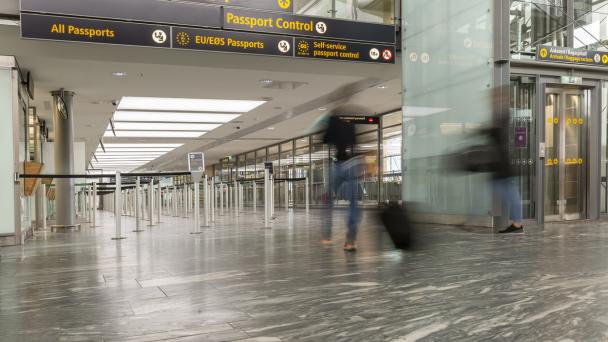Public attitudes towards immigration and ethnic minorities

In May this year, ONS released the 2022 migration figures which reported the highest number of overall migration in the UK since records began.
This year alone the government has announced several measures aimed at reducing immigration.
In a recent speech, the Home Secretary Suella Braverman highlighted how important she believes reducing immigration is to the people in the UK, saying "political systems which cannot control their borders will not maintain the consent of the people".
The European Social Survey (ESS) covers a range of topics including people's opinions towards immigration across a number of European countries, and the 2022 results tell quite a different story.
ESS is a high quality survey which has asked the same questions in the same way for over twenty years. The National Centre for Social Research (NatCen) oversees the survey for the UK and it is this robust methodology that provides confidence in the trends in the data that reflect how our attitudes have changed over time. The general picture shows that while views towards immigration remained relatively stable between 2002 and 2014, they began to become far more positive from 2016 onwards and, in 2022, British people expressed the most positive views towards immigration since the survey began.
The survey includes several questions about how much immigration should be allowed. Turning first to immigrants of the 'same race or ethnic group as the majority', between 2002 and 2014, the proportion who thought we should 'allow many to come and live here' varied between just 10% and 14%. However, in 2016, the year of the Brexit referendum, the proportion began to increase to 19%, and by 2022 had increased to its highest level at 35%. On the flip side, the proportion who think we should allow 'a few' or 'no' immigrants has been decreasing, from 27% in 2002 to 11% in 2022 for 'a few', and 8% to 2% for 'none'.
This trend towards allowing more immigration was also observed for different types of immigrants. In 2002, 8% of people thought we should allow many immigrants 'of a different race or ethnic group to the majority' and this increased to 34% in 2022. This pattern was also seen across age groups, although younger age groups consistently had higher proportions wanting to allow more immigration. For data tables, see 'Table 1' in the attached file (xlsx) at the bottom of this page.
While the research shows that Labour supporters hold much more favourable views about immigration, the move towards becoming more positive is observed for both Labour and Conservative supporters. For example, between 2002 and 2022 the proportion that thought we should allow 'some' or 'many' immigrants from poorer countries outside of Europe increased from 71% to 91% for Labour supporters, and from 63% to 83% for Conservative supporters. In 2022, Conservative supporters were more likely to want to allow 'some' immigrants and Labour supporters to allow 'many' immigrants. For example, 13% of Conservative supporters thought we should allow 'many' immigrants of the same race, whereas 70% thought we should allow 'some'. For Labour supporters, 60% thought we should allow 'many' and 31% thought we should allow 'some'.
The survey asks people to rank out of 10 whether immigration is 'bad or good for the economy', whether 'cultural life is generally undermined or enriched' and whether it makes the country a 'worse or better place to live' (10 being the most positive). In 2022, the responses were the most favourable towards immigration since the survey began. In fact, the survey has uncovered a complete about-turn in our attitudes toward immigration. Back in 2002, a minority of 17% gave a score of 7 or more for the effects of the economy, but by 2022 this had become the majority at 59%. Similar effects were observed on cultural life, (from 33% in 2002 to 58% in 2022) and also making the country a better place to live (20% to 56%). For data tables, see 'Table 2' in the attached file (xlsx) at the bottom of this page.
Looking across political supporters, both parties had an increase in positive views on the effects of immigration, although the increase was smaller for Conservative supporters. In 2022, the majority of Labour supporters believed immigration was good for the economy (78% scoring 7+), culture (82% scoring 6+) and making the country a better place to live (74% scoring 6+). Less than half of Conservative supporters gave a score of 7+ on the effects of immigration on the economy (48%), and less than a third did for the effect on culture (30%) and for making the country a better place to live (29%).
It seems like the issue of immigration is likely to remain on the front pages for some time and could well become a key battleground at the next general election. However, it is clear people in Britain have become much more positive in their attitudes to immigration and on balance now see it in a positive light.

 Press release
Press release


Receive a regular update, sent directly to your inbox, with a summary of our current events, research, blogs and comment.
Subscribe